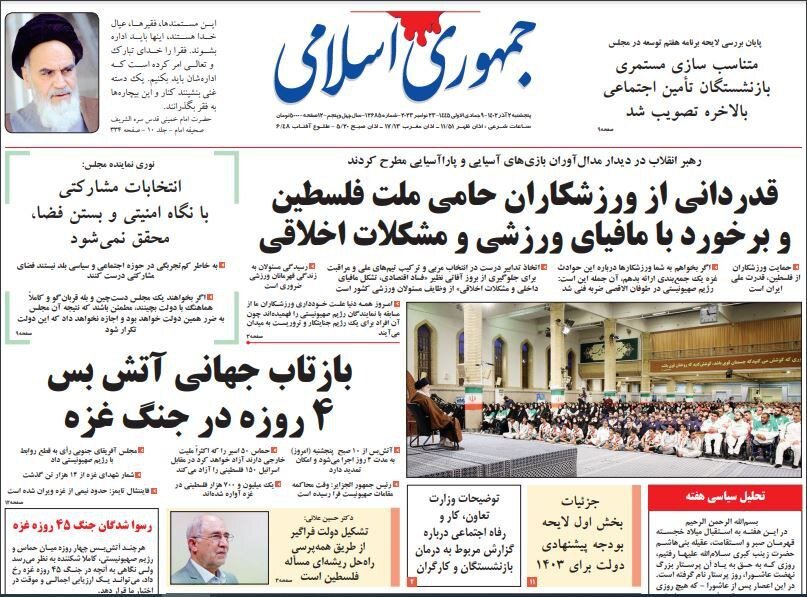An inclusive government: A solution to Gaza crisis

The Jomhouri Eslami newspaper delved into the issue of Palestine and discussed the available options in the aftermath of war.
In an interview with Hossein Alaei, an expert on strategic affairs, the paper analyzed the ramifications of the recent ceasefire between Hamas and Israeli occupiers. Alaei discussed the challenges of the two-state solution, highlighting Israel’s historical reluctance to accept it. Despite some Israeli cabinets expressing verbal support, the practical implementation of the solution that they articulate often contradicts the establishment of an independent Palestinian state. Criticizing the plan for its shortcomings, Alaei pointed out its failure to address key issues, such as the return of Palestinian refugees, ongoing Israeli construction in occupied territories, ambiguous borderlines, and the denial of Palestinian sovereignty, including an independent army. Proposing an alternative, the expert suggested the establishment of an inclusive government through referendum as the most viable option. Emphasizing the need to address the root causes of the Palestine issue, Alaei stated, “This approach aims to bring a permanent end to conflicts, fostering political competition for government formation among all residents, irrespective of their religion or ethnicity.”
Arman-e Melli: Israel in shambles, Natanyahu in distress
In a commentary by Ali Bigdeli, the Arman-e Melli newspaper emphasized that the expansion of the Gaza war is not in the interests of the Israeli regime and its direct supporters, such as the United States. Bigdeli describes Hamas’s October 7 operation as "an irreparable blow" to Netanyahu and the Likud party, causing dissatisfaction even among their supporters. The paper highlights Netanyahu's dilemma as he struggles to secure a lasting ceasefire or withdraw from Gaza without clear gains, leaving Israel facing domestic and international repercussions. Bigdeli highlights the uncertainty of the recent ceasefire, stating that “the benefits for Israel are yet to be clearly defined.” Ismail Haniyeh, a political leader of Hamas, has also acknowledged the ambiguity, emphasizing that the achievements after the release of captives are undetermined. Netanyahu, under unprecedented pressure from families of Israeli captives and party members, confronts a unique challenge, lacking influence over the U.S. president for the first time in Israel’s history. The Western sentiment towards Netanyahu is unfavorable, contributing to a complex and uncertain situation in Israel, where the path forward remains unclear.
Payam-e Ma: Environmental crisis in Gaza
In a report, Mehdi Zare, a geology expert, pointed out that Israel’s bombings will cause catastrophic health issues for the Palestinians in the upcoming years. Emphasizing the environmental impacts of the wartime actions, Zare noted the exacerbation of the casualties and injuries that will lead to the persistence of respiratory, cardiovascular, and cancer diseases among Palestinians. The crisis is further intensified by Israel’s blockade, hindering early medical treatment and disrupting the supply of essential medicines. “Prolonged periods of intense explosions, witnessed in Gaza, release substantial amounts of cement particles into the air, causing respiratory diseases. Chemicals and lethal gases from leftover ammunition linger in the environment, poisoning plant life and contaminating water. In conflict-affected areas, explosive materials can emit significant amounts of greenhouse gases which have devastating effects” Zare remarked. Israel’s use of white phosphorus chemical weapon is another problem as it also impacts the environment. Palestine also struggles with severe water shortages as the water resources are controlled by Israel. According to Oxfam’s report, since Gaza’s sewage treatment plants are closed, untreated sewage is currently being discharged into the Mediterranean Sea, contaminating Palestinians’s source of waters with nitrates over 10 times higher than WHO standards. Yet, over 30,000 infants among Gaza’s 2.3 million residents are forced to drink this nitrate-contaminated water amid Israel’s siege of Gaza. According to Zare, the destruction of vital infrastructure in Gaza by Israeli forces jeopardizes Palestinians’s rights to a clean, healthy, and sustainable environment.
Etemad: Lake Urmia’s death
In a report, the Etemad newspaper investigated the dire situation for Lake Urmia, revealing an alarming 80% shrinkage from 878 to 170 square kilometers in the past year. Once the world's sixth-largest hypersaline lake and Iran's largest inland lake, Lake Urmia now confronts an inevitable demise. While a water industry spokesperson denied claims of complete drying of this lake in September, a closer analysis of satellite images contradicted this assertion. The newspaper further emphasized that mismanagement and the absence of restoration funding cast doubt on the potential revival of Lake Urmia. Environmental and health experts have long warned of the consequences of the lake’s desiccation, which include the emergence of salt marshes. The airborne dust and particles, resulting from soil desiccation, deforestation, and escalating temperatures, pose significant threats to the health of people living near the lake. The paper also highlighted that the shrinkage of the lake has led to a notable decrease in job opportunities, prompting the youth of the region to migrate to cities such as Tabriz and Tehran in pursuit of better prospects.
MAS
Leave a Comment